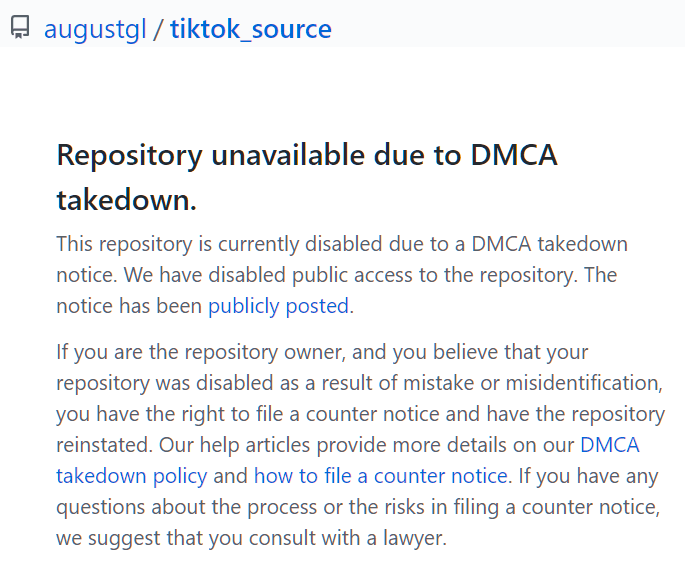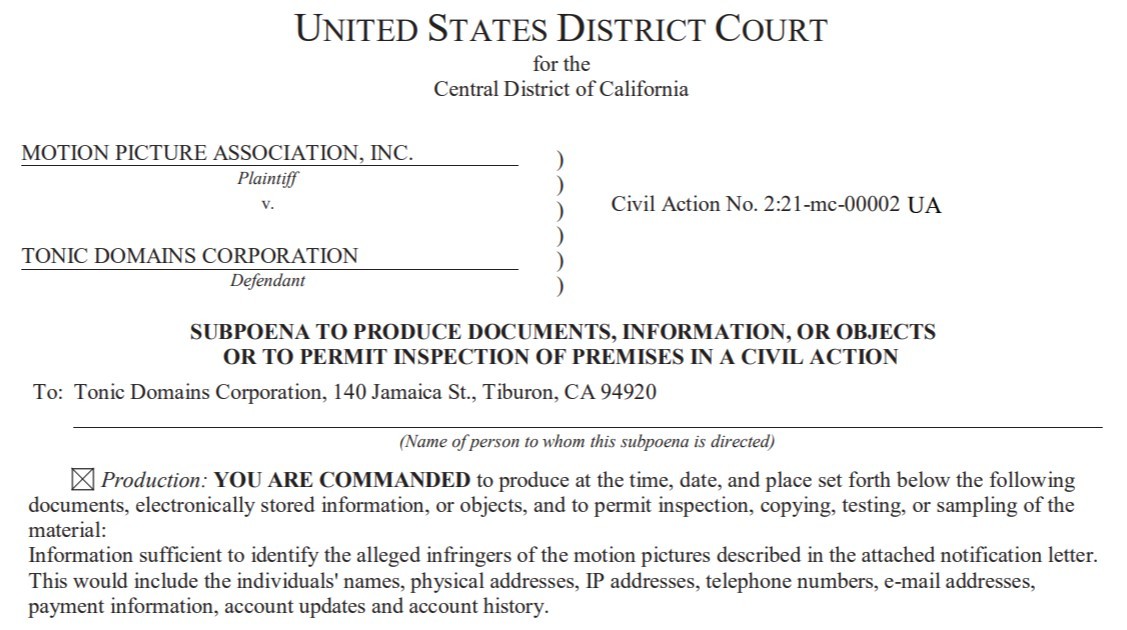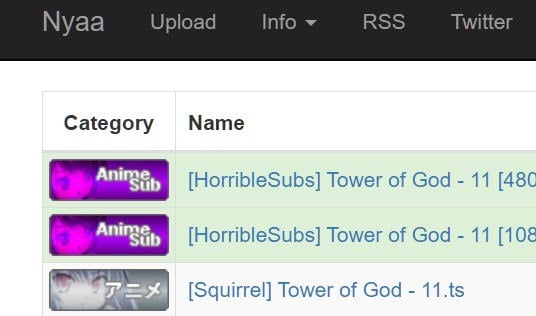-
chevron_right
TikTok Using DMCA to Take Down Reverse-Engineered Source Code
Andy Maxwell • news.movim.eu / TorrentFreak • 17 January, 2021 • 3 minutes
 After being launched in the Chinese market in 2016 as “Douyin”, social networking service TikTok has become one of the world’s recognizable app brands.
After being launched in the Chinese market in 2016 as “Douyin”, social networking service TikTok has become one of the world’s recognizable app brands.
New estimates published this month suggest that TikTok could have as many as a billion monthly users, with around 100 million of those coming from the United States. It’s safe to say the product is already a phenomenon and wildly popular, especially among younger people, but not everyone is happy with its status.
Accusations of Privacy Breaches
Labeled a threat by the Trump administration due to its Chinese connections, TikTok has constantly found itself accused of siphoning off user data for use overseas. According to analysts, however, the software is no more intrusive than Facebook and Instagram. Which, of course, is a pretty low bar by most standards.
Nevertheless, many people simply do not trust TikTok, something which led to a coder known as ‘ augustgl ‘ reverse-engineering the company’s Android app and publishing the resulting source code on developer platform Github.
Published to Github
“This project is a bit different from my other projects. TikTok is a data collection engine disguised as a social media platform. It’s legitimate spyware, so I thought I would reverse engineer the Android application,” wrote ‘augustgl’ on his now-removed Github repo.
The source reportedly published includes that dedicated to location tracking, phone calls, screenshots, WiFi networks, and facial recognition. None of these features appear to have sat particularly well with ‘augustgl’, who signed off with the message, “China, I’ll see you when you send the hitmen to my house.”
While that did not happen, at least as far as we know, TikTok did become aware that reverse-engineered source was being made available online. Unsurprisingly, the social media company then used copyright law to have it taken down.
DMCA Takedowns
“I am legal counsel to TikTok Inc., owner of the copyright that is the subject matter of this notification, and am authorized to act on the owner’s behalf,” the notice begins.
“The original copyrighted work is source code for the TikTok Android app. Github user augustgl appears to claim to have reverse engineered the app. He posted the code to the following GitHub repository: https://github.com/augustgl/tiktok_source .”
At the same time, TikTok asked Github to help clean up all the repositories that had forked the code. In total, 19 other repositories operated by other coders were handed DMCA takedown notices, with Github complying by taking each one down.
While TikTok may have believed it had cleaned up all instances of the reverse-engineered code, there was more work to be done. In a new notice filed this week, TikTok returned for a second sweep, targeting another five repositories that had forked the original, apparently after being notified by Github.
“The original copyrighted work is source code for the TikTok Android app. Github user [redacted, but almost certainly a reference to ‘augustgl’] appears to claim to have reverse engineered the app. We submitted a DMCA notification to GitHub previously, resulting in a takedown. GitHub subsequently notified us that the user still had forks posted,” the DMCA notice reads.
All of the offending repositories appear to have been removed following TikTok’s request but the big question is whether anything surprising or insightful came from the published code, particularly in respect of the privacy and security allegations that have followed the company around in recent times.
TorrentFreak contacted ‘augustgl’ to discover what he’d found, if anything, but at the time of publishing he was yet to respond.
From: TF , for the latest news on copyright battles, piracy and more.


 In 2018, a group of prominent record labels sued two very popular YouTube rippers,
In 2018, a group of prominent record labels sued two very popular YouTube rippers,  Over the past year, the Alliance for Creativity and Entertainment (ACE) added a new tool to its anti-piracy toolbox.
Over the past year, the Alliance for Creativity and Entertainment (ACE) added a new tool to its anti-piracy toolbox.
 The Pirate Bay has had its fair share of troubles over the past year, but it remains the most-visited torrent site.
The Pirate Bay has had its fair share of troubles over the past year, but it remains the most-visited torrent site. After more than 17 years,
After more than 17 years, 

 NYAA.si is a popular resurrection of the anime torrent site
NYAA.si is a popular resurrection of the anime torrent site 
 FitGirl Repacks is by no means a traditional torrent site. It is the home of a popular ‘girl’ who releases slimmed-down cracked versions of popular games, which keeps download times to a minimum.
FitGirl Repacks is by no means a traditional torrent site. It is the home of a popular ‘girl’ who releases slimmed-down cracked versions of popular games, which keeps download times to a minimum. EZTV.re is a controversial TV-torrent distribution group that hijacked the
EZTV.re is a controversial TV-torrent distribution group that hijacked the  Zooqle, which boasts more than five million verified torrents, returns to the top 10 after a year of absence. The site’s traffic still hasn’t returned to its old levels but it seems to have a dedicated userbase.
Zooqle, which boasts more than five million verified torrents, returns to the top 10 after a year of absence. The site’s traffic still hasn’t returned to its old levels but it seems to have a dedicated userbase.

 ABS-CBN is the largest media and entertainment company in the Philippines but also has a strong presence in the US.
ABS-CBN is the largest media and entertainment company in the Philippines but also has a strong presence in the US. Earlier this year Texas-based model
Earlier this year Texas-based model 
